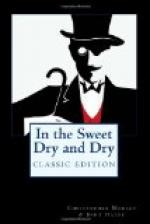Bleak pondered gloomily. As far as he could recall, the Prohibition Government had overlooked nothing. The quaint part of it was that some of its prohibitions, carried to their logical extreme, had curiously overleaped their mark. For instance, finding it impossible to enforce the laws against playing games on Sundays, the Government had concluded that the only way to make the Sabbath utterly immaculate was to abolish it altogether, which was done. Other laws, probably based upon genuine zeal for human welfare, had resulted in odd evasions or legal fictions. For instance, people were forbidden to miss trains. The penalty for missing a train was ten days’ hard labor splitting infinitives in the government tract-factory. Rather than impose this harsh punishment on any one, good-hearted engineers would permit their trains to loiter about the stations until they felt certain no other passengers would turn up. Consequently no trains were ever on time, and the Government was forced to do away with time entirely. Another thing that was abolished was hot weather. It had been found too tedious to tilt the axis of the earth, therefore all the thermometers were re-scaled. When the temperature was really 96 degrees, the mercury registered only 70 degrees, and every one was saying how jolly cool it was for the time of year. This, of course, was careless, for there was no such thing as time or year, but still people kept on saying it. Bleak was thinking over these matters when he suddenly recalled that it was forbidden to remember things as they had been under the old regime. He pulled himself up with a start. In order to make his mind a blank he tried to imagine himself about to write a leading editorial for the Balloon. This was so successful that he did not come to earth again until they stood in the ante-room—or as Quimbleton called it, the anti-room—of the Bishop.
“Who is to be spokesman?” he said apprehensively, gazing with distaste at the angular females who were pecking at typewriters. “It would be unseemly for me to present my own claims in this project. Quimbleton, you are the one—you have the gift of the tongue.”
“I would rather have the gift of the bung,” whispered Quimbleton resolutely as they were ushered into the inner sanctum.
The dreaded Bishop sat at an immense ebony flat-topped desk. The room was furnished like his mind, that is to say, sparsely, and without any southern exposure. A peculiarly terrifying feature of the scene was that the top of the desk was completely bare, not a single paper lay on it. Remembering his own desk in the newspaper office, Bleak felt that this was unnatural and monstrous. He noticed a breathoscope on the mantelpiece, with its sensitive needle trembling on the scaled dial which read thus:—
As he watched the indicator oscillate rapidly on the dial, and finally subside uncertainly at zero, he thanked heaven that they had indulged in no psychic grogs that day.




